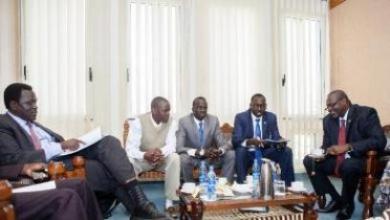SPLM-IO says formation of partial transitional government violates agreement
February 18, 2016 (JUBA) – Forming a partial transitional government of national unity (TGoNU) in Juba without participation of main opposition faction would be a violation of the peace agreement signed five months ago, says an official of the main opposition faction led by the newly appointed First Vice President, Riek Machar.

Ateny also added that the new cabinet may not include 10 nominated ministers of the armed opposition faction of the Sudan People’s Liberation Movement (SPLM-IO) in case they will not submit their list by Thursday.
This slightly contradicted an earlier Tuesday statement by Daniel Awet Akot, former deputy speaker of national parliament and member of the Political Bureau, the highest executive organ of the ruling SPLM party faction led by President Kiir. Akot said the names of the government’s 16 nominated ministers were readily passed by the SPLM and submitted to President Kiir who approved them.
He however added that they were waiting for the top opposition leader, Machar, to return to Juba and take oath of office as First Vice President before the government could be formed.
Ateny’s latest statement, Wednesday, also indicated that the current government’s ministers occupying 10 positions allocated to the SPLM-IO may not be affected by the dissolution of the cabinet and may continue to occupy them until the time when the list of ministers of the opposition faction is submitted to the president.
Officials of the SPLM-IO however stressed that forming a new government without their participation would be violating the power sharing agreement and cabinet mechanisms for decision making processes.
“Forming a partial cabinet will not be considered a transitional unity government. It will be like a normal reshuffle by one party,” Machar’s press secretary, James Gatdet Dak, told Sudan Tribune when contacted on Thursday for comment on the new situation.
“The new cabinet cannot make decisions and pass resolutions which affect the peace agreement without the participation of the SPLM-IO’s 10 ministers. It will be a violation of the peace agreement,” he added.
Dak said there are mechanisms stipulated in the peace deal for achieving a quorum and decision making processes in the would-be cabinet of the transitional government. He added the new cabinet will “either become redundant or violate the peace agreement” should they try to temper with the provisions of the agreement.
The opposition leader’s official spokesman said the leadership of the SPLM-IO called on President Kiir to wait for the arrival of Machar to the capital and together will form the unity government in a “correct way.”
He said the best course of action currently is to concentrate on the implementation of the security arrangements by demilitarizing the national capital, Juba, and transporting to Juba the 2,910 forces of the opposition faction as stipulated in the peace deal.
He added that his boss, Machar, will return to Juba and take oath of office as First Vice President as soon as the forces arrive in the capital.
The formation of the unity government, he said, should take place after the First Vice President is sworn in and take up his position.
Opposition officials say their forces may arrive in Juba in the next two weeks, depending on the speed with which the Troika donor countries facilitate their movement, mainly by river.
(ST)
